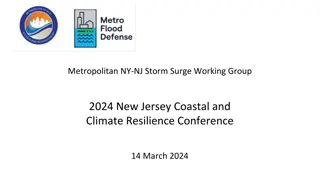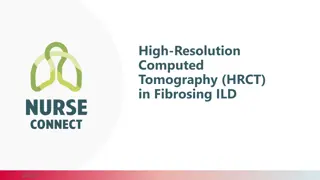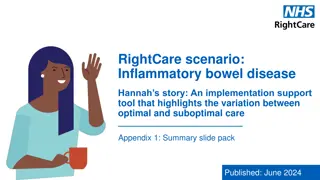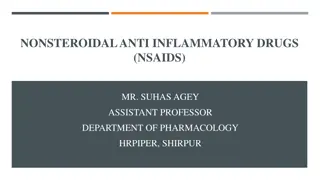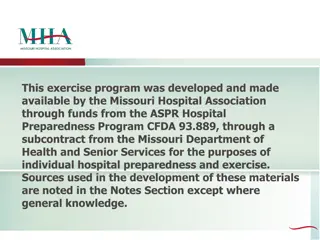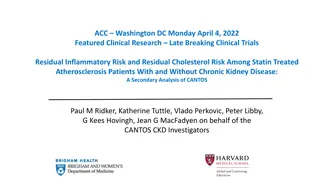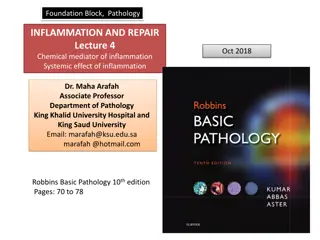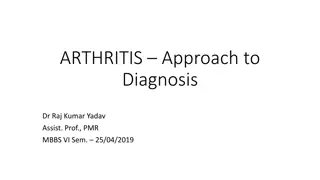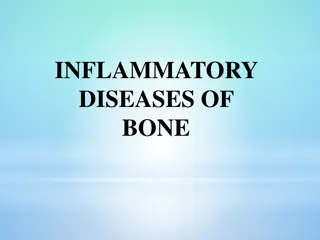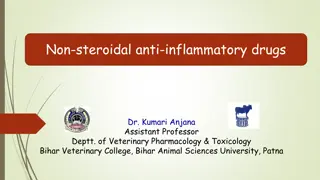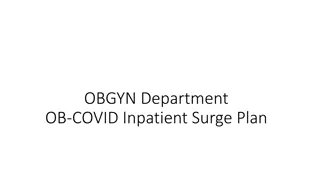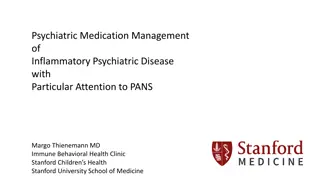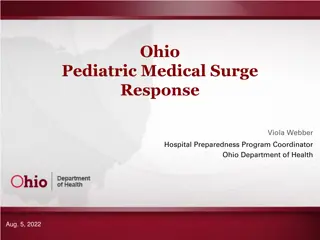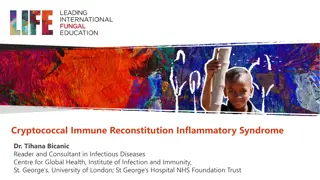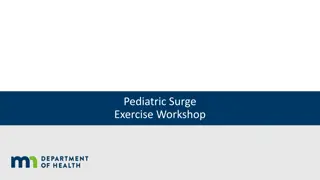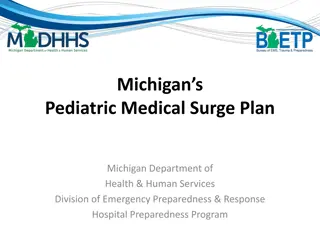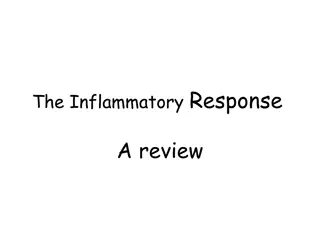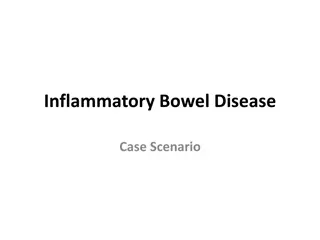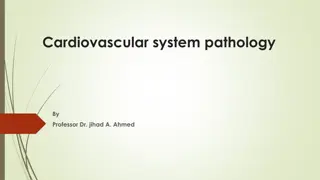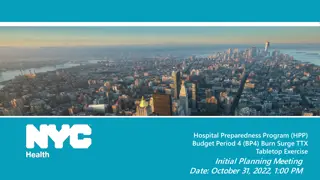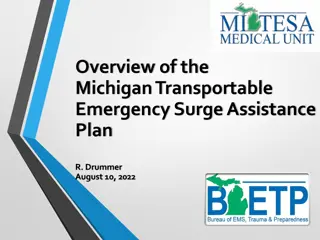Metropolitan NY-NJ Storm Surge Working Group: Resilience Conference 2024
The Metropolitan NY-NJ Storm Surge Working Group focuses on protecting the region against catastrophic flooding from ocean storm surges and rising sea levels. Key topics include storm surge barriers, flood protection proposals, and sea level rise projections. The group emphasizes a regional approach
0 views • 39 slides
Role of High-Resolution Computed Tomography in Fibrosing Interstitial Lung Diseases
HRCT plays a crucial role in diagnosing and monitoring fibrosing interstitial lung diseases (ILDs). It helps identify abnormalities not visible on X-rays, leading to early, accurate diagnoses and potentially avoiding invasive procedures. HRCT assists in distinguishing specific ILDs based on radiogra
1 views • 25 slides
APPROACH TO THE TREATMENT OF INFLAMMATORY POLYARTHRITIS
Inflammatory polyarthritis can have various causes, including infections, systemic rheumatic diseases, crystal-induced arthritis, vasculitides, and more. Dr. Afsar Sayeeda, a consultant internist and rheumatologist, emphasizes early diagnosis and intervention in conditions like rheumatoid arthritis
5 views • 32 slides
Buy-SIDE Exercise Caution- U.S. Bank M&A Deals Surge Amidst Earnings Anxiety
U.S. Bank's surge in M&A activity is tempered by cautious optimism amidst investor concerns over a projected 2.8% earnings dip in 2024, driven by heightened credit costs and commercial real estate delinquencies.
3 views • 7 slides
Podiatrist's Role in Managing Foot Involvement in Rheumatic Diseases
Rheumatology encompasses over 200 conditions affecting the musculoskeletal system, with foot involvement being significant in conditions like RA and OA. Podiatrists play a crucial role in diagnosing, treating, and preventing foot problems associated with inflammatory arthritis, such as joint damage,
0 views • 20 slides
Hannah's Struggle with Inflammatory Bowel Disease: A Journey of Challenges and Lessons
Hannah, a vibrant young woman with a bustling social life and active routines, experiences a series of setbacks in her battle with Inflammatory Bowel Disease (IBD). Her journey highlights the importance of timely diagnosis, access to proper care, and comprehensive support services to manage the cond
0 views • 9 slides
Understanding Nonsteroidal Anti-Inflammatory Drugs (NSAIDs) and Their Pharmacology
Nonsteroidal anti-inflammatory drugs (NSAIDs) are a class of analgesic, antipyretic, and anti-inflammatory medications that work by inhibiting prostaglandin synthesis. They provide relief from pain, reduce fever, and combat inflammation through various mechanisms. Aspirin, a commonly used NSAID, irr
0 views • 21 slides
Understanding Non-Steroidal Anti-Inflammatory Drugs (NSAIDs): Types and Classification
Non-Steroidal Anti-Inflammatory Drugs (NSAIDs) are a diverse group of medications with analgesic, anti-inflammatory, and antipyretic properties. They act primarily on peripheral pain mechanisms and vary in their selectivity of COX inhibition. This article explores the history, classification, and se
1 views • 16 slides
Hospital Patient Triage Exercise Program
This hospital patient triage exercise program, developed by the Missouri Hospital Association, aims to train hospital triage staff in disaster patient triage using the START system. The program focuses on surge capacity, triage tools, response components, and care continuum from conventional to cris
0 views • 40 slides
Overview of Chemical Mediators of Inflammation and Their Roles
Chemical mediators of inflammation act on blood vessels and cells to contribute to an inflammatory response. These mediators include vasoactive amines like histamine and serotonin, plasma proteases such as the complement, kinin, and clotting systems, and important inflammatory mediators like C3a and
1 views • 24 slides
Understanding C-Reactive Protein (CRP) Test: Uses and Principle
C-Reactive Protein (CRP) is a liver-produced protein that indicates inflammatory conditions. The CRP test helps detect infections, monitor diseases like cancer, and evaluate inflammatory conditions. The test principle involves latex agglutination for CRP detection in human serum.
0 views • 21 slides
Managing Anxiety and Depression Amid the Pandemic: Strategies for Rebuilding Surge Capacity
Amid the challenges of the pandemic, it's crucial to recognize signs of anxiety and depression, triggers, and the concept of surge capacity. Understanding how to refuel and rebuild this capacity is key to maintaining mental well-being during these uncertain times. Clinician Maria Green provides insi
0 views • 11 slides
Residual Inflammatory and Cholesterol Risks in Atherosclerosis Patients
In a secondary analysis of the CANTOS study, researchers evaluated the impact of residual inflammatory risk and residual cholesterol risk in a large cohort of atherosclerosis patients already receiving lipid-lowering therapy. Results showed the relative contributions of inflammation and cholesterol
0 views • 11 slides
Surge Deployment Guidelines and Standard Operating Procedures
Surge Deployment Guidelines and Standard Operating Procedures outline the principles and processes for deploying specialized personnel to support humanitarian operations in various emergencies. The guidelines aim to ensure equal opportunity, transparent processes, and quality responses among Red Cro
0 views • 12 slides
Chemical Mediators of Inflammation: Understanding Sources and Effects
Chemical mediators of inflammation play a pivotal role in inducing specific events during acute inflammation. These mediators are produced in response to various triggers, including microbial products and host proteins, leading to a cascade of inflammatory responses. Understanding the sources and ef
1 views • 43 slides
Understanding Arthritis: Diagnosis and Pathophysiology
Joint pain can result from various factors such as inflammation, cartilage degeneration, crystal deposition, infection, or trauma. Different pathophysiologic processes necessitate clinical evaluation and identification through history, physical examination, and understanding of joint disease types.
2 views • 49 slides
Understanding the Peritoneum: Structure, Functions, and Inflammatory Responses
The peritoneum, a vital membrane in the body's abdominal cavity, consists of visceral and parietal components with distinct pain perceptions. It plays crucial roles in lubrication, fluid absorption, immune responses, and more. Peritoneal inflammatory exudate can result from various causes such as ba
0 views • 36 slides
Overview of Inflammatory Diseases of Bone
Inflammatory diseases of bone encompass conditions like osteitis, osteomyelitis, periostitis, and alveolar osteitis (dry socket). Osteitis is localized and may be associated with infected sockets, while osteomyelitis involves the interior of the bone. Alveolar osteitis commonly follows tooth extract
0 views • 20 slides
Overview of Non-Steroidal Anti-Inflammatory Drugs (NSAIDs) in Veterinary Pharmacology
Non-steroidal anti-inflammatory drugs (NSAIDs) are a diverse group of medications with analgesic, anti-inflammatory, and antipyretic effects. They act primarily on peripheral pain mechanisms and have limited CNS effects. NSAIDs have a long history dating back to the use of White Willow bark, and the
0 views • 16 slides
OB-COVID Surge Plan for OBGYN Department Inpatient Care
The OB-COVID Surge Plan outlines the strategies and roles for managing COVID-positive and persons under investigation (PUI) patients in the OBGYN department. The plan includes creating a dedicated OB-COVID team, adjusting inpatient faculty coverage, coordinating with various specialties, and ensurin
1 views • 8 slides
Understanding Medical Surge Logistics in Emergency Situations
Medical surge logistics play a critical role in providing adequate medical evaluation and care during events that overwhelm the normal medical infrastructure of a community. This capability is essential to effectively manage the complex challenges posed by terrorist attacks, natural disasters, and o
1 views • 29 slides
Management of Inflammatory Psychiatric Disease with Focus on PANS in Pediatric Patient
Dr. Margo Thienemann discusses the psychiatric medication management of a 10-year-old boy with inflammatory psychiatric disease, particularly focusing on Pediatric Acute-onset Neuropsychiatric Syndrome (PANS). The patient presented with various symptoms including compulsions, mood swings, OCD, oppos
0 views • 45 slides
Understanding Anti-Inflammatory Foods and Immune Function
Our health is closely linked to the gut microbiome, with fiber playing a key role in feeding beneficial gut bacteria. Incorporating anti-inflammatory polyphenols from plant-based sources like fruits, vegetables, and herbs can promote a healthier gut. Additionally, fermented foods act as natural prob
1 views • 8 slides
HerboJoint: Natural Formulation for Joint Pain Relief
Bordoloi Biotech India Pvt Ltd presents HerboJoint, a unique natural formulation designed to provide freedom from joint pain. Developed by a team of experts led by Dr. Binoy B. Bordoloi and Dr. Kulwant S. Saini, HerboJoint is a scientifically backed product combining essential oils with proven effic
0 views • 14 slides
Understanding Burn Wounds: Pathophysiology and Classification
Burn injuries, such as burns and scalds, are complex inflammatory conditions caused by exposure to heat, chemicals, or electricity. This article delves into the pathophysiology of burn wounds, explaining how tissue damage occurs and the classification of burn depths based on layers of skin affected.
0 views • 19 slides
Ohio Pediatric Medical Surge Response Program Overview
Viola Webber, Hospital Preparedness Program Coordinator at Ohio Department of Health, leads the effort to enhance medical surge response in pediatric hospitals. The program emphasizes situational awareness, information sharing, and resource management. Local municipalities play a crucial role in man
0 views • 10 slides
Understanding Cryptococcal Immune Reconstitution Inflammatory Syndrome
Cryptococcal Immune Reconstitution Inflammatory Syndrome (C-IRIS) is a condition where rapid reversal of immunodeficiency triggers exaggerated inflammatory reactions in response to Cryptococcus antigens. It can manifest as either Unmasking IRIS or Paradoxical IRIS, with common CNS presentations incl
0 views • 10 slides
Understanding the Role of Vitamin D in Reducing COVID-19 Risk
Vitamin D plays a crucial role in reducing the risk of COVID-19 by enhancing the body's immune response, reducing production of pro-inflammatory cytokines, and increasing anti-inflammatory cytokines. Individuals at greater risk include the elderly, those with chronic diseases, dark-skinned individua
0 views • 23 slides
Johns Hopkins Hospital COVID Situational Update and Surge Plan Summary
This update provides an overview of the GME Office House Staff Council meeting, leadership panel members, agenda items discussing COVID numbers at Hopkins, statewide COVID hospitalizations, and details of Johns Hopkins Hospital Surge Plan 4.0 revised on 8/19. The plan includes phases, bed allocation
0 views • 22 slides
Johns Hopkins Hospital COVID Update and Surge Plan
The GME Office at Johns Hopkins Hospital provided a situational update on 9/9/2021 regarding COVID numbers, trainee updates, and the state of the house. The hospital's leadership panel and surge plan for COVID patient management were discussed, along with details on COVID census, statewide hospitali
0 views • 19 slides
Pediatric Surge Exercise Workshop for Emergency Response Training
This workshop focuses on preparing participants for pediatric surge events, covering topics like incident command roles, facility operations during emergencies, family/media designation, lockdown procedures, and more. Scenarios are presented for practical application, such as a school bus accident w
0 views • 10 slides
Michigan Pediatric Medical Surge Plan Overview
The Michigan Statewide Pediatric Steering Committee has developed a framework for the Pediatric Medical Surge Plan, with ongoing work needed for review and updates. The plan aims to guide medical care provision for children during disasters, involving various stakeholders and following defined traum
0 views • 18 slides
Understanding Pterygium: Degenerative or Inflammatory Change?
Pterygium, a common ocular surface lesion, has historically been considered degenerative due to factors like UV radiation exposure. However, recent research suggests an inflammatory component with cellular proliferative fibrosis and angiogenesis. This study presented at TOSCON 2024 delves into the h
0 views • 6 slides
Understanding the Inflammatory Response Mechanism
The inflammatory response is a crucial defense mechanism of the immune system. It comprises three lines of defense aimed at protecting the body from harmful pathogens. When a barrier is breached, such as by a splinter carrying bacteria, the inflammatory process is initiated. This includes the releas
0 views • 25 slides
Inflammatory Bowel Disease Case Study: Diagnostic Challenges and Treatment Decision
A 56-year-old male with a history of inflammatory bowel disease presented with severe symptoms necessitating hospitalization. Despite steroid therapy, lack of improvement led to consideration of a total colectomy. Colonoscopy and biopsy results favored ulcerative colitis over Crohn's disease. This c
0 views • 31 slides
Understanding Inflammatory Disorders of the Cardiovascular System
Inflammatory conditions of the heart, such as pericarditis and myocarditis, can have various causes and manifestations. Pericarditis can present as fibrinous, purulent, or hemorrhagic, each with distinct characteristics and implications. Myocarditis, on the other hand, can result from infections lik
0 views • 9 slides
Integrating Physical and Social Science for Effective Storm Surge Communication
The integration of physical and social sciences is crucial for effectively communicating complex storm surge threats. Collaborative efforts involve various stakeholders like the National Weather Service, NOAA, emergency managers, social scientists, media, and private sector representatives. Strategi
0 views • 10 slides
Critical Care Aspects of COVID-19: Insights from Dr. Vikram Mukherjee, MD
Explore the critical care aspects of COVID-19 discussed by Dr. Vikram Mukherjee, MD, covering clinical characteristics, organ dysfunction, outcomes, inflammatory surge, X-ray findings, and more. Gain insights on the presentation, progression, and management of severe cases, including ARDS, cytokine
0 views • 21 slides
Hospital Preparedness Program (HPP) Budget Period 4 Burn Surge TTX Tabletop Exercise Initial Planning Meeting
The Hospital Preparedness Program (HPP) Budget Period 4 (BP4) Burn Surge TTX Tabletop Exercise Initial Planning Meeting, scheduled for October 31, 2022, involves trusted agents discussing exercise objectives, planning updates, and timelines in preparation for the upcoming tabletop exercise. Importan
0 views • 30 slides
Michigan Transportable Emergency Surge Assistance Plan Overview
Michigan Transportable Emergency Surge Assistance (MI-TESA) Plan is a state resource established for emergency preparedness, featuring a mobile field hospital with various facilities and equipment stored strategically in Michigan. The primary healthcare mission of MI-TESA is to augment existing heal
0 views • 14 slides
